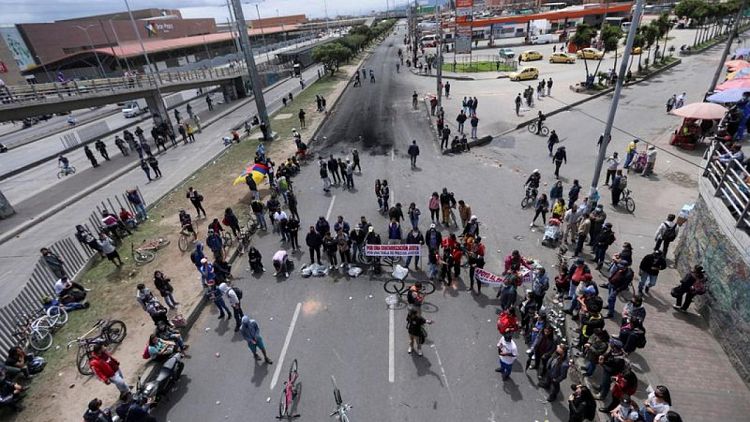By Oliver Griffin and Julia Symmes Cobb
BOGOTA (Reuters) -Colombia's government and national strike committee, made up of major unions and student groups, reached "pre-agreements" on Monday which the government said it hopes will lead to talks to end almost a month of widespread protests.
The protests, which began in late April in opposition to a now-canceled tax plan, have been marked by violence. The attorney general's office early on Monday confirmed 17 deaths connected to protests, though one human rights group has reported more than 40 people presumably killed by security forces.
More than a week of talks between the government and protest leaders resulted in a final document of pre-agreements late on Monday, the government said.
"The session of conversations between the national government delegation and the national strike committee has today permitted the completion of a document of pre-agreements," it said in a statement, without providing further details.
The pre-agreements will now be examined by the strike committee's assembly and by other government representatives.
"We continue in the construction of the meeting points which we hope will allow us to carry out the swift installation of negotiations," the government said.
The leader of the General Work Confederation (CGT) union told media earlier on Monday pre-agreements were 90% complete.
Strike committee representatives have warned the government that it must honor agreements and called for major marches this week.
Though sparked by opposition to the tax plan, the demonstrators' demands have expanded to include a basic income, an end to police violence and opportunities for young people.
As well as the deaths, the attorney general's office said 129 people reported missing were still being sought and 290 others have been found. Rights groups say the number of missing is much higher.
The withdrawal of the proposed tax reform prompted the resignation of the former finance minister, while a health system reform was shelved by lawmakers.
Road blockades connected to protests have paralyzed exports and caused shortages of gasoline and food, though more than 500 have been lifted, according to the government.
(Reporting by Oliver Griffin and Julia Symmes Cobb in BogotaEditing by Matthew Lewis, Robert Birsel)
